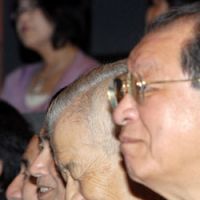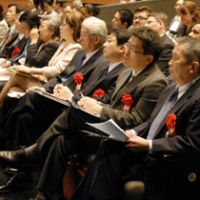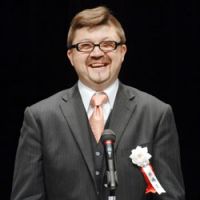Once a year, embassy officials in Japan are given a chance to showcase their Japanese ability at the Japanese Speech Contest for Foreign Embassy Officials. This year's contest was held on April 11 in Tokyo's Chiyoda Ward and, as always, the speeches were open to the public.
The contest, sponsored by the Foreign Ministry, the Agency for Cultural Affairs, the Chiyoda Ward, NHK, The Japan Times and the International Policy Committee of the Junior Chamber International Tokyo, drew some 200 people to listen to the talks.
Participants spoke in Japanese for five minutes each on a wide variety of topics. Some drew on their personal experiences in Japan. Others spoke about their cultures and home countries. Hobbies was the topic of choice for others and some spoke on social issues.
One thing, however, that all the speakers had in common, was a love of Japan and a commitment to building amicable relationships and promoting mutual understanding with Japanese people.
"I decided to participate in the contest because I want Japanese to understand the hearts of the Mexican people," said Luis Raul Curiel Ruiz in fluent Japanese during a break in the contest. Ruiz works at the Mexican Embassy.
This year's contest, held at Uchisaiwaicho Hall, was the 12th and featured 21 contestants from 19 countries.
The Foreign Minister's Prize, awarded to the best speaker, was won by Batykhan Kurmanseit of the Kazakh Embassy, whose speech was entitled "I am a foreigner wherever I go."
The Kazakh, who could pass for a Japanese, had the audience in stitches with his personal anecdotes relating how nobody can ever guess where he is from — the ninth-largest country in the world.
In his speech, Kurmanseit talked about how he had asked for a fork and bread at a ramen shop soon after he came to Japan. He couldn't use chopsticks and he had always eaten bread with every meal in his home country.
The man in the ramen shop asked where he was from. "I told him to guess, and he said he thought I was French," Kurmanseit said, prompting a burst of laughter from the audience.
Oddly, he is often mistaken for a Japanese and has been praised for his skill with what are his mother tongues — Kazakh and Russian — when interpreting between the two languages and Japanese.
"I don't mind what country people think I am from because I'm from a country where more than 100 different ethnicities live in harmony," Kurmanseit said in his speech in Japanese.
After receiving the Foreign Minister's Prize, he said, "I think of myself as a foreigner, or an earthling, everywhere I go . . . I just wanted to make a speech on what I experienced."
The Education, Culture, Sports, Science and Technology Minister's Prize, what is considered the runnerup prize, was won by Wang Shu of the Chinese Embassy for his speech "Chinese words of Japanese origin: bonds connecting China, Japan and the world."
"I appreciate the judges for bestowing this honor on me," Wang said, holding his trophy. "Every (contestant) on the stage has made a lot of effort to understand Japan. I hope to continue my efforts."
The Agency for Cultural Affairs' Prize went to Petr Holy of the Czech Embassy whose speaking skills during "What kabuki taught me" amazed the audience. Holy boasted a near-native accent, rich vocabulary and profound knowledge of the Japanese traditional theater.
Only some 10 percent of the audience was made up of non-Japanese. Lisa Hayes, 34, wife of Australian contestant Peter Roberts, listened to the entire event intently, though she admitted she did not understand very much of the speeches due to her poor Japanese ability.
"My knowledge of Japanese is limited, so I am still learning," she said.
Participants overall enjoyed the event as a way to make contact with their counterparts in other countries, something they don't often have the opportunity to do.
They also used the event as an incentive to study Japanese more.
"I have studied two weeks for this event," Christian De Jesus of the Embassy of the Philippines said during a recess in the event.
He gave his reason for participating as, "I wanted to study Japanese more. Also, the ambassador asked me to."
Yoriyoshi Naito, chairman of the committee organizing the contest, expressed his gratitude for the efforts of the participants.
"Language reflects what has been accumulated over the years, from the country's history and the lifestyles of the people. It is impossible to understand language without a knowledge of culture and other aspects of the country," Naito said. "Participants are certainly busy with their duties at their embassies, but still find time to study and build friendships with Japanese. I respect them for studying Japanese."
The 19 contestants this year were from the embassies of: Mexico, Australia, Republic of Cameroon, China, Czech Republic, Germany, India, Iraq, Republic of Kazakhstan, United States of America, Kyrgyz Republic, Latvia, Kingdom of Lesotho, New Zealand, the Philippines, Russia, Republic of Senegal, Singapore and Cuba.





















With your current subscription plan you can comment on stories. However, before writing your first comment, please create a display name in the Profile section of your subscriber account page.